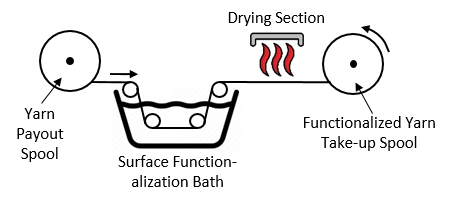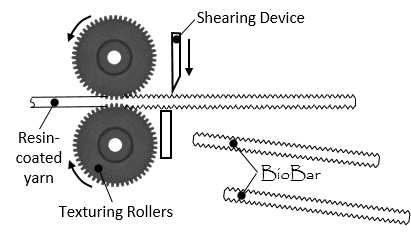CASE based startup, FibreWerks, Receives FuzeHub Manufacturing Grant
August 26th, 2025
FibreWerks Inc., led by Dr. Alexandros Tsamis, Associate Director of CASE and Dr. Daniel Walczyk, Co-Director of the RPI New York Fashion Innovation Center and Professor of Mechanical Engineering, is a Rensselaer Polytechnic Institute spinout company located at CASE in Brooklyn, NY and is developing next-generation, low-carbon, natural-fiber biocomposite manufacturing technologies and products for construction. The startup was just awarded $65,000 in FuzeHub’s 2025 Manufacturing Grant Program, Round 2 entitled for ‘Pultrusion of Sustainable Microbar for Reinforced Concrete.’
Throughout a 12-month project, FibreWerks in collaboration with RPI will design and implement manufacturing equipment improvements and material innovation for their first product to market, BioBar, a sustainable microbar made from hemp and a new bioplastic - that is used as an alternative to rebar in reinforced concrete. This new material is innovating infrastructure and construction applications.
FibreWerks is introducing BioBar as its first product which will help reinvent the market for sustainable construction materials with clear environmental, manufacturing and cost benefits. BioBar is made from a composite of inexpensive, undegummed hemp or flax yarn that is functionalized for enhanced bonding to a bio-based thermoplastic polyester matrix and then textured. Advantages are that it is non-corroding, compostable, simpler to process, and expected to be price comparable while being stronger than market alternatives.
The project team will be working on two parallel efforts to develop and finesse BioBar production. Dr. Tsamis and Dr. Walczyk of FibreWerks and RPI will lead the pultruder (a machine that enables the continuous production of fiber-reinforced composites of uniform cross section) design and prototyping, while Dr. Ed Palermo and Dr. John Leman of RPI Material Science and Engineering will lead new material development.
CASE and RPI Engineering are thrilled to support FibreWerks in this endeavor as they continue to develop BioBar and contribute to groundbreaking, interdisciplinary design and technology in the building world. This project is recognized for its innovation and potential impact to advance economic development and technological progress in New York State.
Header images left to right:
1. Hemp Macrofiber Putruder prototype
2. Hemp Macrofiber (Minibar) protoype
Diagrams left to right:
1.Functionalization process for the hemp yarn so that thermoplastics will bond to it.
2. Impregnation of the hemp yarn with thermoplastic to make a biocomposite filament.
3. Texturing of the still malleable biocomposite filament to create BioBar. The texturing helps to mechanical bind it to concrete when mixed in. macrofiber pultrusion and texturing process to create BioBar.
Images by Alexandros Tsamis and Daniel Walcyzk.
Media Contact:
Kathie Brill, Program Manager
Brillk@rpi.edu





